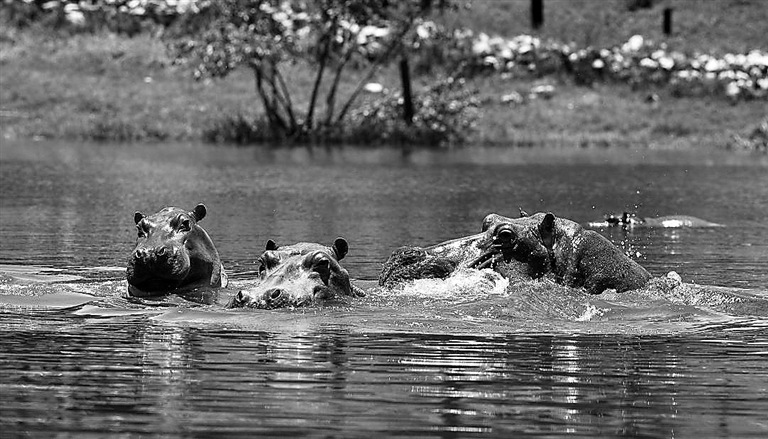
COLOMBIA’S best-known drug trafficker, Pablo Escobar, may have been killed in 1993 but his influence continues to be felt in the country, sometimes in unexpected ways. Hippopotamuses brought to Colombia as part of Escobar’s private zoo at his ranch, Hacienda Napoles, have bred so successfully that there is serious concern over their environmental impact and human safety, according to a new study by researchers at Mexican and Colombian universities. The hippos have spread out from their original home, some 160 kilometers east of the city of Medellin, in the Antioquia department, dispersing around the Magdalena river basin as their population continues to grow steadily. The authors of the study, published in the January edition of the journal Biological Conservation, recommend that the hippos be culled to prevent long-term negative effects, but other scientists are calling for a castration program to control the hippo population, citing concerns over animal welfare and the attachment of some locals to their new neighbors. Back in the 1980s, Escobar imported one male and three female hippos to join his menagerie. Upon his death, other species of exotic animals were relocated, but the hippos were left because they were difficult to capture and transport, according to the study. The hippos soon began to spread in the surrounding area, but government efforts to cull them were halted after a public outcry. A sterilization campaign was begun instead, but it has done little to slow the hippos’ progress. From 2011 to 2019 four males were castrated and two females were sterilized, but this “does not seem to have an important impact on reproduction,” according to the study. Researchers say there are probably more than 80 hippos in the area today, up from 35 in 2012, and they worry that the hippos will continue to spread throughout Colombia if no action is taken. The study also cites research showing the negative effects of hippo waste on oxygen levels in bodies of water, which can affect fish and ultimately humans, and raises concerns about the possible transmission of diseases from hippos to humans. Hippos also pose a threat to the livelihoods and security of people in affected areas, the study said, eating or damaging crops and engaging in aggressive interactions with humans. The researchers cite incidences of hippos chasing people, as well as a hippo attack in May 2020 in which a 45-year-old man was seriously injured. But while the study’s authors recommend a cull, Enrique Zerda Ordonez, a biologist at Colombia’s National University, believes castration programs are the way forward. Culling the hippos would be an “easy option,” said Zerda, but it could affect the survival of a species that is under threat in Africa. Though sterilizing hippos is no easy task, he said, he believes it is both possible and necessary to do so now, before their numbers rise further, according to a press release from the university. (SD-Agencies) | 
